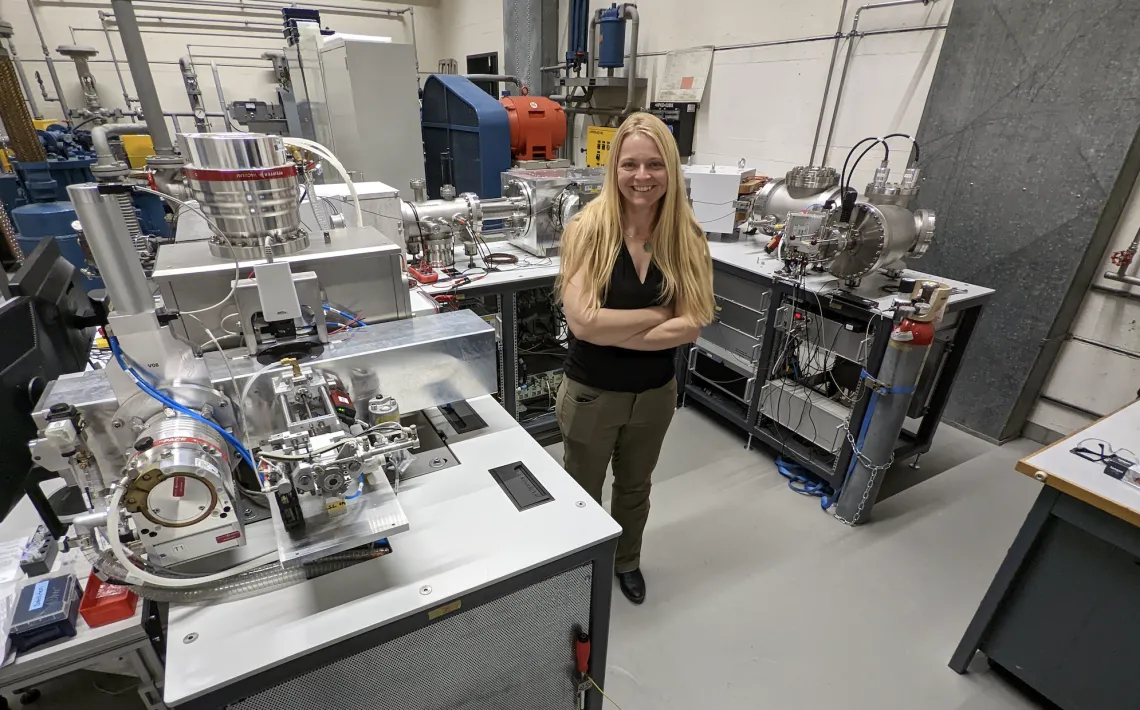Dr. Charlotte Pearson Receives National Science Foundation MRI Grant for Groundbreaking Mini Carbon Dating System

Dr. Charlotte Pearson in the Laboratory of Tree-Ring Research, with support of co-investigators Dr. Kevin Anchukaitis, Dr. Bryan Black, and Dr. Kaustubh Thirumalai, received a National Science Foundation Major Research Instrument Program grant funding a Mini Carbon Dating System (MICADAS) to measure the amount of radiocarbon or Carbon-14 in organic (and some inorganic) materials at the University of Arizona.
The instrument will be integrated into the research, teaching, and public outreach programs of the world’s founding Laboratory of Tree-Ring Research (LTRR), which has interwoven with radiocarbon dating since inception of the technique in the 1960s.
"The new accelerator mass spectrometer will serve as a nexus for next generation radiocarbon applications ranging from solar physics, earth, ocean and atmospheric sciences to studies of art, architecture and the rise and fall of civilizations," said Dr. Pearson. "This grant will build on a unique University of Arizona legacy of innovation and scientific advancements combining tree-ring and radiocarbon science."
The instrument’s accessibility, high capacity, and throughput, plus sample preparation requirements, will also provide outstanding teaching and training opportunities to benefit undergraduate and graduate STEM students, early-career researchers, and faculty at the University of Arizona. This provides unique opportunities to enhance and broaden outreach and teaching by combining these two dating and paleoenvironmental reconstruction methods in new ways to introduce core scientific concepts, tell science stories, and inspire new experimentation and applications at the cutting edge of Carbon-14 analysis. These efforts will be accelerated by the proximity of the instrument to the LTRR’s Tree-Ring Archive that houses millions of ready-to-analyze, unique, annual-scale Carbon-14 samples. The new research hub will provide training in the combined use of the two most precise and internationally used dating methods which underpin our understanding of life on earth across the last 10,000 years and beyond.
“Once this state-of the-art equipment is built and situated in purpose renovated labs in 2024, and coupled with the critical scientific, technical, and administrative expertise under one roof, LTRR will be a center for novel research and training opportunities ranging from quantifying variability and extreme events of our Sun, to predicting carbon cycle dynamics in terrestrial and marine ecosystems, to understanding how ancestors overcame challenges in the past,” reflected Dr. David Frank, LTRR’s Director since 2016. “I am grateful for the intellectual leadership of Dr. Pearson and her collaborators at UArizona and beyond reflected in this award, and I look forward to this new era for the LTRR and connected disciplines and user communities."
Since 2015, Dr. Pearson's research program combining tree-ring and radiocarbon science has been supported by the Malcolm H. Wiener Foundation. This support has put in place the essential foundations upon which a new research facility will be established. Learn more about Dr. Wiener and his interest in using tree-ring and radiocarbon data to understand past civilizations.
With the support of the National Science Foundation, the Major Research Instrumentation (MRI) Program serves to increase access to multi-user scientific and engineering instrumentation for research and research training in our Nation's institutions of higher education and not-for-profit scientific/engineering research organizations. An MRI award supports the acquisition or development of a multi-user research instrument that is, in general, too costly and/or not appropriate for support through other NSF programs. MRI provides support to acquire critical research instrumentation without which advances in fundamental science and engineering research may not otherwise occur. MRI also provides support to develop next-generation research instruments that open new opportunities to advance the frontiers in science and engineering research. Additionally, an MRI award is expected to enhance research training of students who will become the next generation of instrument users, designers, and builders.
Through the College of Science's own linkage - including studies in the life and molecular sciences, earth and environmental sciences, physics and space sciences, mathematics and computational sciences and cognitive sciences - and its external connections to national and international institutions and organizations, students and faculty at the College of Science have access to interdisciplinary resources that can readily address the multi-faceted issues facing society. By preparing students to understand the complexity of scientific research, faculty at the College of Science strengthen their knowledge and understanding of their disciplines in relation to others. Through the nurturing and development of effective partnerships and collaborations, the College of Science is able to share its passion for research and pursue solutions that impact society on many different levels.
Learn more about Dr. Pearson and her dendroarchaeological research here.

